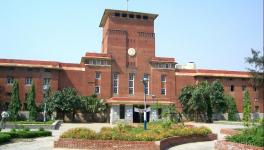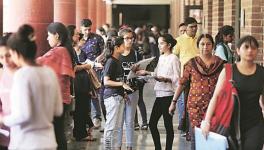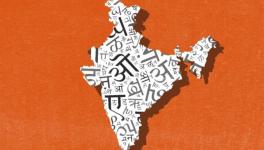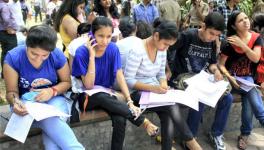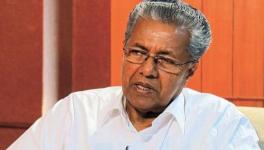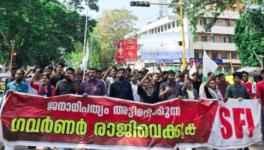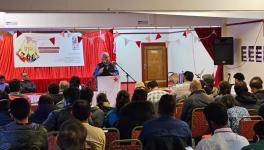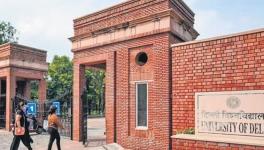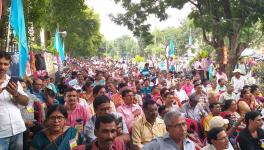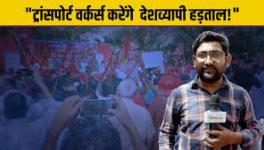Tamil Nadu School Education Policy Note Fails to Address Concerns Raised in NEP
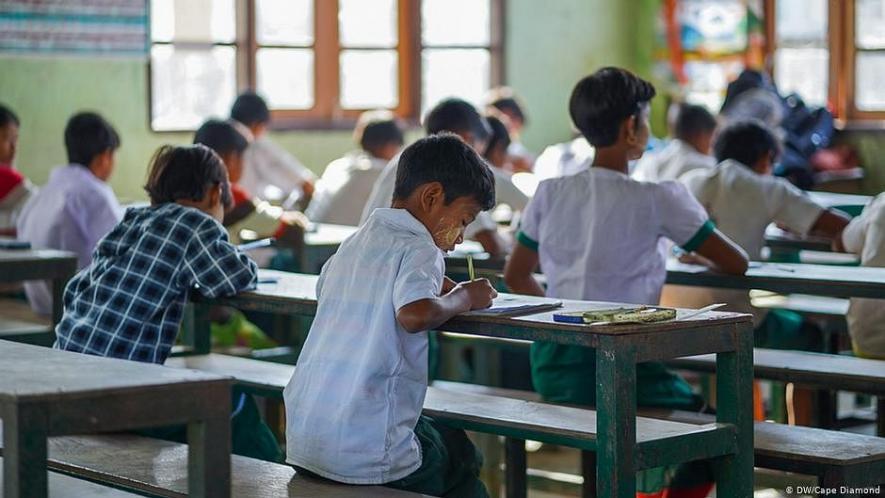
Representational Image. Image Courtesy: Social Media
The 2021-2022 school education policy note of the Dravida Munnetra Kazhagam (DMK) government has failed to address pressing concerns, including the ones raised by the party in the National Educational Policy (NEP). Academics, teachers and student organisations were expecting concrete announcements as the DMK has consistently opposed the NEP.
The policy note, which has demanded a grant of Rs 32,599.54 crore and listed the functioning of different directorates, has failed to detail the government’s policy on reinvigorating the ailing schools. Besides, the appointment of special teachers and non-teaching staff to government and government-aided primary schools has failed to find attention in the policy.
The government’s permission to NGOs to operate nutrition meal schemes in schools and its eagerness to use their infrastructure for expediting online classes has caused a flutter.
NEP CONCERNS UNADDRESSED
The DMK has consistently opposed the NEP since the Bharatiya Janata Party (BJP) government released the draft alleging that it tries to impose Hindi and Sanskrit on the education system by “trying to do away with Tamil” and protect the caste hierarchy system. After coming to power, the DMK made its intention clear on the NEP by boycotting the meeting of state education secretaries.
In its first revised Budget, the DMK announced the formation of a committee on the formulation of the state’s education policy.
“The policy note has failed to address the concerns raised by the state government in the NEP,” Prince Gajendra Babu, general secretary, State Platform for Common School System, Tamil Nadu, told Newsclick. “The note has not detailed the number of meetings held by the Union government and NCERT and whether any state government official participated in them.”
Academician professor Karunanandhan, in an interview to Tamil weekly magazine Ananda Vikatan, said, “After opposing the NEP while in the Opposition, the DMK now seems to be implementing parts of the NEP.”
OPPOSITION TO INVOLVING NGOs
Academicians and student organisations have opposed the permission granted to NGO Agastya International Foundation for conducting online classes for students.
When Aloor Shanavas, a Viduthalai Chiruthaigal Katchi MLA, raised the issue in the Assembly, minister for school education Anbil Mahesh Poyyamozhi responded that the “organisation is conducting classes in 20 states under its corporate social responsibility. The organisation has also sponsored labs for schools. Such organisations will be used by the state. And, we will not dilute our position (on opposing the NEP)”.
The argument of the state government on utilising the NGO’s infrastructure has failed to impress the stakeholders. Karunanandhan argued that the state government cannot monitor how the Foundation is teaching the students. “It’s impossible to monitor such NGOs.”
The Students Federation of India (SFI) held state-wide protests demanding the cancellation of the permission granted to NGOs. Such moves will only end up in the implementation of the NEP, the SFI said.
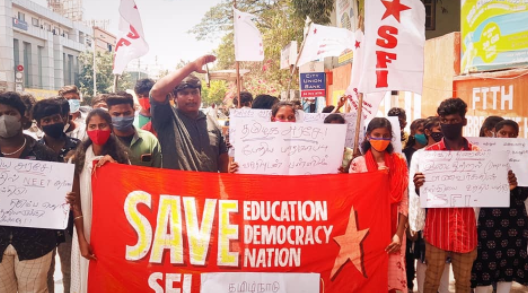
SFI members protesting in Chennai demanding ban on NGOs involvement on conducting classes.
“The state government runs a television channel and has said that it is capable of running two more channels. If there is sufficient infrastructure, why depend on NGOs? It is the failure of the government if it relies on private players for technological support,” Babu said.
NO DATA ON STATUS OF SCHOOLS AND STUDENTS
The policy note also mentions that out of 92,234 habitations in the state, 90,009 habitations are served by primary schools, 91,045 by upper-primary schools, 90,101 habitations by high schools and 90,308 habitations are served by higher secondary schools.
“But, the policy note fails to mention whether the habitations are served by government or government-aided or private schools. How can we interpret these numbers without knowing the status of the schools?” Babu asked.
Another important data missing in the policy note is the number of students from different socioeconomic backgrounds schools with low or zero enrolment. “If the policy lacks information on the social status of the students, how are we supposed to obtain the details? Besides, the government has not spelled out plans to revive the ailing schools.”
“With no mention of plans to conduct survey on the poor enrolment in state-funded schools, is the government planning to silently close such schools?” Babu asked.
The retention ratio in the schools remains high at 99.25 in primary schools, 98.6 in upper-primary schools and 96.75 in secondary schools. The state has also ensured that the gross enrolment ratio is maintained as in the past.
APPOINTMENTS AND INFRASTRUCTURE
The appointment of teachers for computer science, physical education and arts and crafts and non-teaching staff in government and government-aided primary schools has not been mentioned in the policy note either. “Primary school students need activity-based learning, which has become more important since the schools are closed,” Babu said.
Poyyamozhi informed the Assembly that Rs 34 crore has been sanctioned under Samagra Shiksha for the construction of toilets for boys, girls and children with special needs. “All schools should be provided with clean and adequate functional toilet,” the policy note says.
“Is there a separate provision for safe drinking water and water for cleaning toilets? Will the school education department hire full-time employees to clean the toilets,” Babu further asked.
Get the latest reports & analysis with people's perspective on Protests, movements & deep analytical videos, discussions of the current affairs in your Telegram app. Subscribe to NewsClick's Telegram channel & get Real-Time updates on stories, as they get published on our website.









